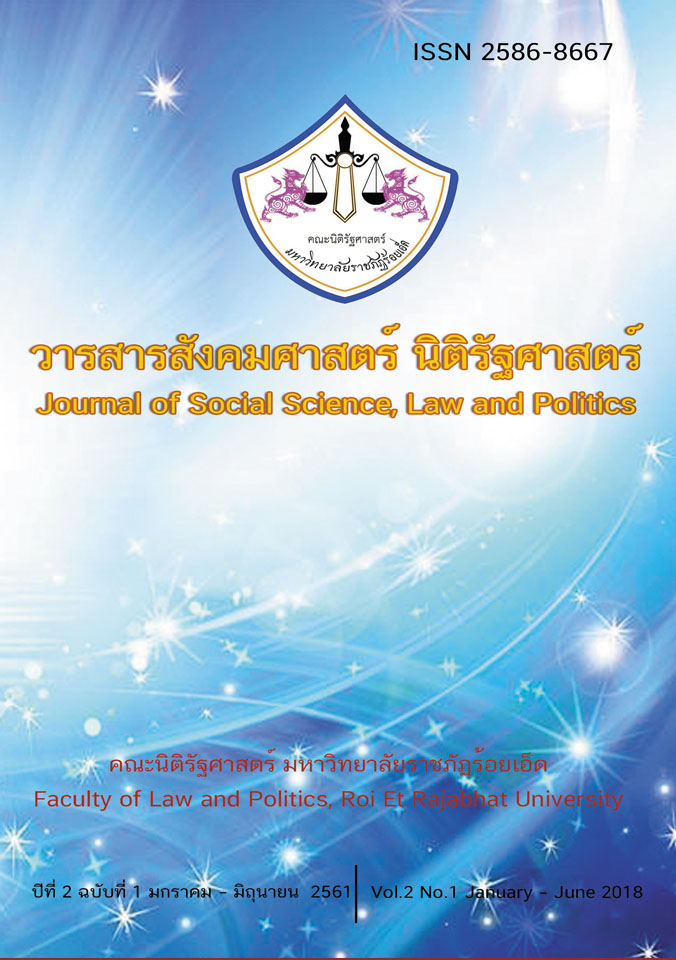กระบวนการเข้าเป็นสมาชิกสหภาพยุโรปกับการคุ้มครองสิทธิชนกลุ่มน้อยในบัลแกเรียโรมาเนียและสโลวาเกีย
คำสำคัญ:
เงื่อนไขการเข้าเป็นสมาชิกสหภาพยุโรป, สโลวาเกีย, โรมาเนีย, การคุ้มครองสิทธิชนกลุ่มน้อย, บัลแกเรียบทคัดย่อ
บทความเรื่องนี้นำเสนอผลกระทบที่สำคัญของกระบวนการเข้าสู่การเป็นสมาชิกของสหภาพยุโรปและการบูรณภาพยุโรปต่อประเทศในยุโรปกลางและตะวันออก โดยวิเคราะห์จากมุมมองของการคุ้มครองสิทธิของชนกลุ่มน้อยในบริบทของกระบวนการสมัครเพื่อเข้าเป็นสมาชิกสหภาพยุโรปของบัลแกเรีย โรมาเนีย และสโลวาเกีย ข้อเสนอของบทความชิ้นนี้คือ การบูรณภาพยุโรปได้สร้างผลกระทบในเชิงบวกต่อการคุ้มครองสิทธิชนกลุ่มน้อยในยุโรปกลางและตะวันออกในช่วงก่อนการเข้าเป็นสมาชิก โดยเฉพาะอย่างยิ่งผ่านการใช้เงื่อนไขการเข้าเป็นสมาชิกสหภาพยุโรป นำมาซึ่งการเมืองที่เปิดกว้างยิ่งขึ้น อีกทั้งการเสริมพลังให้กับพรรคการเมืองชนกลุ่มน้อยและลดความตึงเครียดในความสัมพันธ์ระหว่างรัฐที่เป็นเจ้าบ้านของชนกลุ่มน้อยกับรัฐข้างเคียงที่มีความสัมพันธ์เชิงชาติพันธุ์กับชนกลุ่มน้อยนั้น
เอกสารอ้างอิง
Agarin, T. & Cordell, K. (2016). Minority Rights and Minority Protection in Europe. Maryland, USA: Rowman & Littlefield.
Anagnostou, D. (2007). Nationalist Legacies and European Trajectories: Post-Communist Liberalization and Turkish Minority Politics in Bulgaria. Southeast European and Black Sea Studies, 5(1), 89-111.
Andreescu, G. (2002). Universal Thought, Eastern Facts: Scrutinizing National Minority Rights in Romania. In W. Kymlicka and M. Opalski (Eds.), Can Liberal Pluralism be Exported?: Western Political Theory and Ethnic Relations in Eastern Europe. (pp. 127-134). Oxford: Oxford University Press.
Anghelescu, A. (2016). Europeanisation in Bilateral Relations: The Cases of Minority Rights Policies in Eastern Europe in the Context of Enlargement Policy. Eurolimes, 139-155.
BBC. (2001, June 19). Hungary ‘Status Law’ irks neighbours. Retrieved from http://news.bbc.co.uk/2/hi/world/monitoring/media_ reports/ 1397385.stm
Brusis, M. (2015). The European Union and Interethnic Power-Sharing Arrangements in Accession Countries. Journal of Ethnopolitics and Minority Issues in Europe, 14(4), 60-78.
Bulgarian Parliament. (1991). Constitution of the Republic of Bulgaria. Retrieved from http://www.parliament.bg/en/const
Carp, R. (2014). The Struggle for the Rule of Law in Romania as an EU Member State: The Role of the Cooperation and Verification Mechanism. Utrecht Law Review, 10(1), 1-16.
Chiva, C. (2006). Ethnic Minority Rights in Central and Eastern Europe: The Case of the Hungarian ‘Status Law’. Government and Opposition, 41(3), 401-421.
De Witte, B. (2000). Politics versus Law in the EU's Approach to Ethnic Minorities. Florence: European University Institute. Duin, P. V. & Ková, Z. P. (2000). Democratic Renewal and the Hungarian Minority Question in Slovakia. European Societies, 2(3), 335-360.
Eide, A. (2013). Ensuring Social and Economic Rights of National Minorities through the Work of the Advisory Committee on the Framework Convention. In T.H. Malloy, U. Caruso & R. Hofmann (Eds.), Minorities, their rights, and the monitoring of the European Framework Convention for the Protection of National Minorities: Essays in honour of Rainer Hofmann. (pp.33-56). Leiden: Nijhoff.
European Commission. (2016, June 12). Accession criteria. Retrieved from https://ec.europa.eu/neighbourhood-enlargement/policy/ glossary/ terms/accession-criteria_en
EUR-Lex. (2017, April 5). Accession criteria (Copenhagen criteria). Retrieved from http://eur-lex.europa.eu/summary/glossary/ accession_criteria_copenhague.html
European Parliament. (2018, February 2). Values. Retrieved from http://europarlamentti.info/ en/values-and-objectives/values/
Frye, T. (2010). Building States and Markets After Communism. Cambridge: Cambridge University Press.
Galbreath, D. J. & McEvoy, J. (2012). The European Minority Rights Regime: Towards a Theory of Regime Effectiveness. New York: Palgrave Macmillan.
Hughes, J. & Sasse, G. (2015). Monitoring the Monitors: EU Enlargement Conditionality and Minority Protection in the CEECs. Journal on Ethnopolitics and Minority Issues in Europe. 14(4), 26-59.
Hughes, J., Sasse, G. & Gordon, C. (2004). Europeanization and Regionalization in the EU's Enlargement to Central and Eastern Europe: The Myth of Conditionality. New York: Palgrave Macmillan.
Kymlica, W. (2002). Western Political Theory and Ethnic Relations in Eastern Europe. In W. Kymlicka & M. Opalski (Eds.), Can Liberal Pluralism be Exported?: Western Political Theory and Ethnic Relations in Eastern Europe. (pp. 3-16). Oxford: Oxford University Press.
Lordache, C., Avram, S. & Vilcea, C. (2013). Mutations in the ethnic structure of the Romanian population in the post-communist period. Revista de Stiinte Politice, 37/38(3), 167-174.
Mahon, M. (1999). The Turkish Minority under Communist Bulgaria - Politics of Ethnicity and Power. Journal of Southern Europe and the Balkans, 1(2), 149–162.
Malová, D. & Világi, A. (2007). Policy report on the Hungarian minority in Slovakia. Retrieved from http://www.eliamep.gr/wp-content/uploads/en/2009/04/slovakia_policy_report_final.pdf
Moravcsik, A. & Vachudova, M. A. (2003). National Interests, State Power, and the EU Enlargement. East European Politics and Societies, 17(1), 42-57.
Nugent, N. (2007). The EU’s Response to Turkey's Membership Application: Not Just a Weighing of Costs and Benefits. Journal of European Integration, 29(4), 481-502.
Paul, E. L. (2003). Perception vs. Reality: Slovak Views of the Hungarian Minority in Slovakia. Nationalities Papers, 31(4), 485-493.
Phillips, A. (2013). The Beginning. In T. H. Malloy, U. Caruso & R. Hofmann (Eds.), Minorities, their rights, and the monitoring of the European Framework Convention for the Protection of National Minorities: Essays in honour of Rainer Hofmann. (pp.15-42). Leiden: Nijhoff.
Punthong, W. (2018, January 19). Getting Eastern Partnership in Perspective: Just a Political Placebo?. Retrieved from https://sisu.ut.ee/descnet/blog/getting-eastern-partnership-perspective-just-political-placebo
Rechel, B. (2009a). Introduction. In B. Rechel (Ed.), Minority Rights in Central and Eastern Europe. (pp. 1-16). London and New York: Routledge.
Rechel, B. (2009b). Bulgaria: Minority Rights ‘Light’. In B. Rechel (Ed.), Minority Rights in Central and Eastern Europe. (pp. 77-89). London and New York: Routledge.
Sabanadze, N. (2009). Beyond Conflict Prevention: HCNM and Minority Integration in Minority Integration in Central Eastern European. In T. Agarin & M. Brogis (Eds.), Minority Integration in Central Eastern Europe: Between Ethnic Diversity and Equality. (pp. 103-125). Amsterdam and New York: Rodopi.
Sasse, G. (2004). Minority Rights and EU Enlargement: Normative Overstretch or Effective Conditionality. In G. N. Toggenburg (Ed.), Minority Protection and the Enlarged European Union: The Way Forward. (pp. 59-84). Budapest: Open Society Institute.
Sasse, G. (2009). Tracing the Construction and Effects of EU Conditionality. In B. Reche (Ed.), Minority Rights in Central and Eastern Europe. (pp. 17-31). London and New York: Routledge.
Schimmelfennig, F. & Sedelmeier, U. (2004). Governance by conditionality: EU rule transfer to the candidate countries of Central and Eastern Europe. Journal of European Public Policy, 11(4), 661-679.
Sedelmeier, U. (2012). Is Europeanisation through Conditionality Sustainable?: Lock-in of Institutional Change after EU Accession. West European Politics, 35(1), 20-38.
Spirova, M. (2012). European Integration and Minority Politics: Ethnic Parties at the EP Elections. East European Politics, 28(1), 76-92.
Stroschein, S. (2011). Demography in ethnic party fragmentation: Hungarian local voting in Romania. Party Politics, 17(2), 189–204.
Vachudova, M. A. (2001). The Leverage of International Institutions on Democratizing States: Eastern Europe and the European Union. Florence: European University Institute.
Vasilevich, H. (2013). Majority as Minority – a Comparative Case of Autochthonous Slavs in Lithuania and Hungarians in Slovakia after the Second World War. In J.D. Iglesias, N. Stojanović & S. Weinblum (Eds.), New Nation – States and National Minorities. (pp. 99-122). Colchester, UK: ECPR Press.
Veebel, V. (2009). European Union’s Positive Conditionality Model in Pre-Accession Process. TRAMES, 13(3), 207–231.
______ (2012). The Role and Impact of Positive Conditionality in the EU Pre-Accession Policy. Tartu: Tartu University Press.
Vermeersch, P. (2015). EU Enlargement and Minority Rights Policies in Central Europe: Explaining Policy Shifts in the Czech Republic, Hungary and Poland. Journal of Ethnopolitics and Minority Issues in Europe, 14(4), 114-140.
Vizi, B. (2009). Hungary: A Model with Lasting Problems. In B. Rechel (Ed.), Minority Rights in Central and Eastern Europe. (pp. 119-134). London and New York: Routledge.
World Population Review. (2017, December 21). Bulgaria. Retrieved from http://worldpopulationreview.com/countries/bulgaria-population/
World Population Review. (2017, December 21). Slovakia. Retrieved from http://worldpopulationreview.com/countries/slovakia-population/
ดาวน์โหลด
เผยแพร่แล้ว
รูปแบบการอ้างอิง
ฉบับ
ประเภทบทความ
สัญญาอนุญาต
บทความที่ได้รับการตีพิมพ์เป็นลิขสิทธิ์ของวารสารสังคมศาสตร์ นิติรัฐศาสตร์ มหาวิทยาลัยราชภัฎร้อยเอ็ด
ความคิดเห็นในบทความและงานเขียน ซึ่งตีพิมพ์ในวารสารฉบับนี้ เป็นความคิดเห็นส่วนบุคคลของผู้ประพันธ์โดยอิสระ กองบรรณาธิการ วารสารสังคมศาสตร์ นิติรัฐศาสตร์ไม่จำเป็นต้องเห็นด้วยเสมอไป หากท่านประสงค์จะนำบทความหรืองานเขียนเล่มนี้ไปตีพิมพ์เผยแพร่ จะต้องได้รับอนุญาตจากผู้ประพันธ์ตามกฎหมายว่าด้วยลิขสิทธิ์




